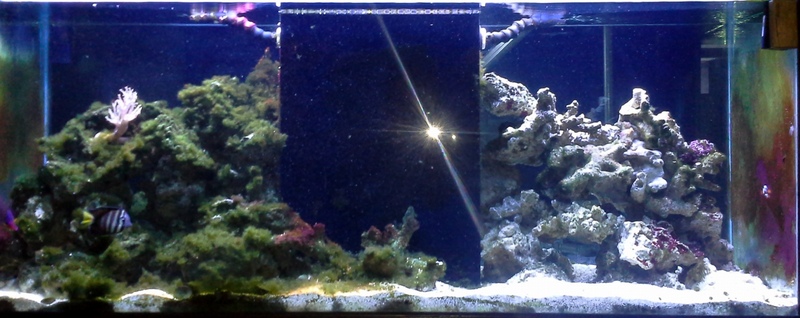So I have a tank maintenance company, and I came across "the dirtiest tank ever". The system was engulfed in cyano, hair algae, and dinoflagellates. Water column NO3 tested at about 750 ppm (tested by using 0.1 mL tank water and 0.9 mL new SW), and phosphate was 3.5 ppm. The nitrate is now 0.25-0.5 ppm and phosphate is about 0.2 ppm (still working to get it down lower). The tank housed a massive Snowflake Eel for a long time before it was removed and some other fish were added. The tank was fed clams on the half shell for years, and the tank didn't get any water changes (the half-full salt bucket was one of the old screw-lid Instant Ocean buckets). In the beginning I removed about 4 gallons worth of clam shells out of the sand. It was a long road, but it actually looks like a reef now with nice purple rocks.
What I'm concerned about is the massive amount of nutrients and the massive amount of clams fed to the tank - is there a possibility there are heavy metals in the tank from all the clams? I ask because I've lost a lot of inverts in this tank - snails, conchs, and urchins. If heavy metals are a possibility, what's the best way to assess? The owner added some corals to the tank early on (to my dismay), and to my surprise they mostly survived - Donut, Favites, some mushrooms, a Torch. I removed a few small predatory crabs awhile back, and haven't seen any shed exoskeletons since. I don't think it's a predator. The inverts that die I often find still in their shells or empty shells on the rocks, nothing gathered around a certain area or anything.
What I'm concerned about is the massive amount of nutrients and the massive amount of clams fed to the tank - is there a possibility there are heavy metals in the tank from all the clams? I ask because I've lost a lot of inverts in this tank - snails, conchs, and urchins. If heavy metals are a possibility, what's the best way to assess? The owner added some corals to the tank early on (to my dismay), and to my surprise they mostly survived - Donut, Favites, some mushrooms, a Torch. I removed a few small predatory crabs awhile back, and haven't seen any shed exoskeletons since. I don't think it's a predator. The inverts that die I often find still in their shells or empty shells on the rocks, nothing gathered around a certain area or anything.
Last edited:



















